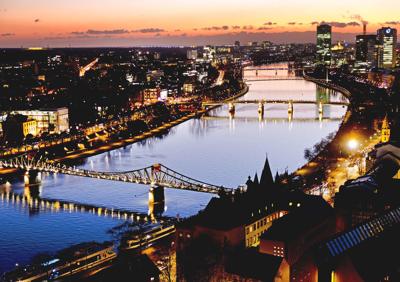As Europe struggles, Germany still a beacon of stability

The sun sets over the River Main in Frankfurt, Germany, Wednesday, Jan. 2, 2019. (AP Photo/Michael Probst) –
BERLIN — European politics just now is a story of how one decision by a pastor’s dutiful daughter has made life miserable for a vicar’s dutiful daughter.
Two of the world’s most important conservative parties are involved in an unintended tutorial on a cardinal tenet of conservatism, the law of unintended consequences, which is that the unintended consequences of decisions in complex social situations are often larger than, and contrary to, those intended.
In 2015, Angela Merkel, the Federal Republic of Germany’s first chancellor from what was East Germany, chose to welcome into Germany about 1 million people, many of them Syrians, fleeing Middle Eastern carnage. This influx stoked European anxieties about immigration threatening social cohesion, anxieties that contributed to the 52 percent-48 percent vote in Britain’s 2016 referendum directing the government to extricate the United Kingdom from the European Union.
In 2019, Theresa May, who was not yet Britain’s prime minister when the referendum occurred and who voted to remain in the EU, is leading, or trying to lead, a fractious party that cannot govern because there is no majority for any plan to effectuate what in 2016 was, but might not still be, the voters’ Brexit desire.
For many years, Merkel has been the closest approximation to an answer to the famous question attributed to Henry Kissinger: If I want to talk to “Europe,” who do I call? She also has embodied Germany’s primal desire for stability, a desire that is the great national constant since Konrad Adenauer served as the Federal Republic of Germany’s first chancellor from 1949 to 1963.
Britain is perhaps, or sort of, exiting the EU. France’s “yellow vest” protesters recently commented on President Emmanuel Macron’s policies with a Gallic vigor (burning cars, smashing shop windows) sufficient to change governance in the predictable direction (taxes decreased, entitlements increased). So, stable Germany is even more important to Europe than it was when Kissinger said that Germany is too large for Europe and too small for the world.
The two greatest leaders of post-1945 Europe, Charles de Gaulle and Margaret Thatcher, opposed the aspiration of an ever-deeper political unification of Europe. Germany precipitated the post-1945 recoil against nationalism, which has been interpreted to dictate the dilution of nationalities by submersion of them into a transnational broth. For most Germans, tiptoeing through modern memory, disputing this interpretation still seems transgressive.
No European nation was as enchanted as Germany was by Barack Obama’s studied elegance and none is more repelled by Donald Trump’s visceral vulgarity. This especially matters at this moment when events are underscoring Germany’s necessary dependence for security on the United States: Germany lives in the neighborhood with two nations, Poland and Hungary, that have illiberal populist regimes. And not far over the horizon Vladimir Putin is destabilizing and dismembering Europe’s geographically largest nation, Ukraine. Germany’s dependence was inadvertently highlighted by Macron’s delusional statement that there must be a “true European army” to “protect ourselves with respect to China, Russia and even the United States.”
Germany has two of the world’s great parties, the Christian Democratic Union and the Social Democratic Party, which in the 19th century invented social democracy that helped to drain the revolutionary steam from the left. Both are in flux.
The CDU is challenged from the right by Alternative for Germany (the subject of a subsequent column) and the SDP, which withered as the junior partner in Merkel’s coalition. The SDP is being eclipsed by the Green Party, whose support rivals that of the CDU, and which is the most popular party with German women.
Extremism, however, is quarantined by the civic culture that so values stability that a poll in this decade showed that more Germans fear inflation — the hyperinflation of 95 years ago was the ultimate destabilizer — than fear cancer or other serious illnesses.
Next year will be the 30th anniversary of German reunification. This will be an occasion for the world to acknowledge that, as has been truly said, today’s Germany is the best Germany the world has seen since it became Germany in 1871.
George Will is a columnist with the Washington Post Writers Group.